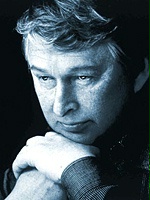Mike Nichols

Mike Nichols was born on this day in 1931 in Berlin.
The grandsons of Jewish socialist/anarchist Gustav Landauer and opera librettist Hedwig Lachmann, Michael Peschkowsky and his brother Robert were sent by their family from Nazi Germany to live with an English family in America in 1938; their parents followed shortly thereafter, and they adopted the surname "Nichols" after his father's Russian patronymic "Nicholaiyevitch." Although the family was impoverished, Mike Nichols attended private schools on scholarship (with a reported IQ of 180); but he was a loner, the sour-tongued bald kid (having lost all of his hair at age 4 due to a reaction to a whooping cough vaccination) with the German accent.
At the University of Chicago, he got a job as a staff announcer on a classical music station (shedding the German accent for a crisply sophisticated American one), but he found his real outlet in the theater. Paul Sills, the founder of The Compass improv group (later called Second City), brought his friend Elaine May to see Nichols on stage, telling her "I want you to meet the only person at the University of Chicago who is as hostile as you." Nichols and May got into each other's respective craws immediately, and in 1957 they began performing deadpan comic dialogues on stage at The Compass that were so close to being straight that you could cut the gender-tension with a knife. Their comedy emerged directly from the ambiguous negotiations of this man and this woman -- whether it was a "romantic spat between dentist and hygienist during oral surgery" or a pair of hopeful pseudo-intellectual singles discussing Bartok and Nietzsche. They released a popular record of their material (Improvisations to Music, 1958), appeared on radio and TV, and from Chicago they played their act to critical acclaim on Broadway in 1960. The record of their Broadway show, An Evening with Mike Nichols and Elaine May, won a Grammy in 1961, but in that year they abruptly announced their break-up; according to Nichols, he gave it up because satire got too trendy.
Nichols turned to directing (avoiding writing almost altogether), winning his first 2 of 7 Tony Awards for his productions of Neil Simon's Barefoot in the Park (1964) and The Odd Couple (1965). He made his debut as a film director with a well-received version of Edward Albee's Who's Afraid of Virginia Woolf? (1966, with Elizabeth Taylor and Richard Burton), but Nichols was hailed as the great new director of his generation with The Graduate (1967; best director Oscar), a film that focused on 20-somethings before it was trendy to do so, used a contemporary score (by Simon and Garfunkel), and featured the lemony Dustin Hoffman as a rather unconventional leading man.
With Hollywood at his feet, Nichols' natural orneriness, perhaps, led him to take on a series of offbeat challenges as follow-up projects, including a disappointing version of Joseph Heller's Catch-22 (1970) and the sexually candid Carnal Knowledge (1971). After The Fortune (1975, with Jack Nicholson and Warren Beatty), he returned to the theater for a time, but reemerged in Hollywood with Silkwood (1983). During the 1980s and 90s, he turned out a series of more conventional, immaculately realized comedies with stellar casts, such as Working Girl (1988), Postcards from the Edge (1990), Wolf (1994), The Birdcage (1996) and Primary Colors (1998). In 2001 he won an Emmy for his HBO production of Wit (with Emma Thompson) and scored another triumph with the HBO mini-series based on Tony Kushner's Angels in America (2003).
Labels: Classic Cinema, Theater





1 Comments:
And he has a pretty snapping wife also.
Post a Comment
Subscribe to Post Comments [Atom]
<< Home